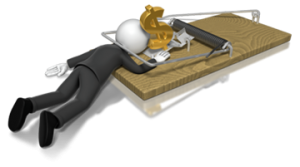Way back when I studied economics at school I was told about Financial Leverage (often called gearing in the UK). Basically it is a way of increasing gains by borrowing money to invest and get a higher ROI (Return On Investment) than the cost of borrowing.
Suppose you can buy new machinery for $20,000 to increase production and make a profit of 10% ($2,000). If you have $10,000 and borrow the other $10,000 at 7% then you effectively make 13%. The additional profit of $2,000 is split $700 for the bank and $1,300 for you.
This doesn’t just apply to business. Back in the 70’s I bought a house for £13,700 after taking a mortgage of £10,000. I did some repainting and small repairs and after 5 years sold it for £17,000 net of fees. I now had over £7,000 since I had repaid part of the loan, hence in 5 years I nearly doubled my £3,700. The amount paid in interest was less than it would have cost to rent somewhere to live.
The problem is that in recent years businesses and individuals have over leveraged, with larger and larger loans and lower personal investment.
Additionally markets have become more competitive, so the profit margins have in many cases been reduced. A lot of businessmen don’t realize that if things don’t work out the leverage effect is reversed.
Investment is a lot riskier and the more you invest with borrowed money the bigger the hole you get in if the profit margin is lower than the cost of the capital…
In the example of the machinery suppose the profit from the extra production was just 4% (i.e. $800) you would only have 1% for yourself after paying the bank interest.
But if you had borrowed 75% of the $20,000 you would have a loss of $250.
If you were selling on credit any payment delay from your clients would also put your business at risk because it might compromise your ability to meet the repayments to the bank.
Nowadays it is much harder to get financing and some banks are no longer in the lending business.
Banks that are still making loans are looking very closely at the risk – they want to see business plans, have real guarantees (security) and shorter pay-back periods.
The best way to run a business is to try to avoid external financing as much as possible. Then if results aren’t as good as expected you are not going to lose everything you have to the bank.
The reversal of the leverage effect can result in negative capital, which for home loans is referred to as being ‘underwater’ – more owed than the value of the property.
Shakespeare wrote “neither a borrower nor lender be” in Hamlet in 1602.
Banking was not so developed back then, but the perils of loans were well known (he had already written “The Merchant of Venice” where the plot hinges on a loan that went bad and the Banker wanting his ‘pound of flesh’).
Unfortunately borrowing went too far, everyone is in debt – nations, local authorities, businesses and individuals. Many students mortgaged their future income before they had a job and unemployment is higher than never with most average salaries going down…
The German economy has not suffered to the same extent as a lot of other countries in the recent economic downturn. This may partly be due to their tendency to avoid borrowing. The German word for Debt is ‘Schuld’, which is the same word they use for ‘Guilt’.
Perhaps we all need a sense of guilt if we get into debt to motivate us to get out of it quickly.
